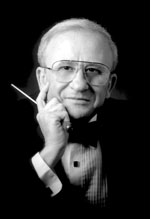By David Amos

SAN DIEGO — I envisioned the ultimate inter-religious composition when Leonard Bernstein wrote his celebrated Mass. But I ran into a piece, newly composed which was offered as an orchestral set to be played during the end of year holidays. It is called “A Klezmer Christmas”.
There are many books on the great conductors of the Twentieth Century. They contain many famous names that are familiar to you and me. But, as some of these publications state, the conductors that are honored are the ones who innovated, broke grounds in unexplored areas, or were notorious in aspects other than the music itself. But I regret not seeing the name of Antal Dorati listed more frequently among the greats. His contributions to orchestral music are innumerable. He also composed. And his historic recordings with the Minneapolis Symphony for Mercury Records in the 50’s and 60’s are solid and authoritative. If you happen to own some of these old LPs or the CD re-issues, listen to them carefully, and you will see what I mean. Our own San Diego classical station, XLNC, 104.9 FM frequently plays some of these gems. Many years ago I remember Dorati, conducting the Los Angeles Philharmonic in San Diego, playing Prokofiev’s Symphony No. 5; it was nothing less than memorable.
A sign of the times: Two years ago, our granddaughter, 6 years old at the time, came to visit us in San Diego. Upon entering our home, for the first time in, say, two years, she went straight to our Yamaha grand, looked at what was in front of her, and yelled to her older brother, “How do turn this thing on?”
“How to explain great music from mass-marketed comfort music? It is like tearing the petals off a rose to explain the flower.” We have a duty to differentiate between high art and the illiterate pandering to the masses. Even within classical music we have self appointed pseudo-visionaries who have no clue as to their own vision. Leave it to artists with logic and an intelligent plan to set artistic courses, trends, and directions while, of course, not losing track of the budgetary confinements. I like the expression “ clarity of purpose”.
I saw a film clip in the Arts Channel, (broadcast by Cox Cable) of legendary conductor Sergiu Celibidache, directing Ravel’s Alborada del Grazioso, with the Munich Philharmonic. Wow! Now, you can see a conductor who really knows his score, understands the composer’s intentions, and transmits this to the musicians, who in turn, create it into music. Even if one only knows the music in a casual way, just to see the motions and expressions of a great master, one can capture the depth of his conducting. This is something that you rarely see today with the younger maestros. During my student days at Indiana University, we were taught that a conductor should not even attempt to direct an orchestra in a musical composition that is not completely relegated to memory. In other words, a conductor should close the orchestral score, and be able to re-write
it, note by note. Only after doing this, one would dare to face and orchestra to direct that particular piece. It may sound ridiculous and impractical in today’s fast-paced world, but that is exactly what many past masters were able to do; and this is why we have so many jewels in the great recordings of the 20th Century. They overwhelm so many of today’s so-called conductors.
Music is interpreted, enjoyed, or not enjoyed by the listener’s preconceived notions of earlier exposures to a particular work. We are mostly influenced by renditions we heard in our younger years. Therefore, objective and truth in artistic matters can become illusive and distorted. We have to be careful of premature expectations, and keep an open mind to other interpretations which could be potentially valid.
*
Here is an amusing story from Oscar Levant’s book The Memories of an Amnesiac;
I was invited to perform for President Truman at the White House.
Margaret Truman was my dinner partner, which pleased me. I was quite nervous about the recital I was to give. The program was supposed to be precisely twenty-four and a half minutes long.
After dinner, I was escorted to the piano by a naval aide who stood at arm’s length with a gun. I thought, if I make a mistake, I’ll be shot.
Later, President Truman told me, in a mild tone of protest, that he would have preferred more Chopin.
As we left the White House, I turned to (my wife) June and said, Now, I guess, we owe the Trumans a dinner”.
*
Amos is conductor of the Tifereth Israel Community Orchestra in San Diego and has guest conducted professional orchestras around the world.